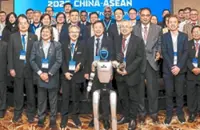For the past 15 years or so, no other piece of technology has been able to impact our daily lives so much as the smartphone – but one product launch has just given an example of how AI could soon change that. — Photo: Humane/dpa
SAN FRANCISCO: Could AI make your smartphones obsolete?
After a slow build-up of hype in recent months, a startup run by two former Apple employees has launched their vision of a product that promises to let us use our voices and hands to do most of the stuff we currently do while looking at a smartphone screen.





